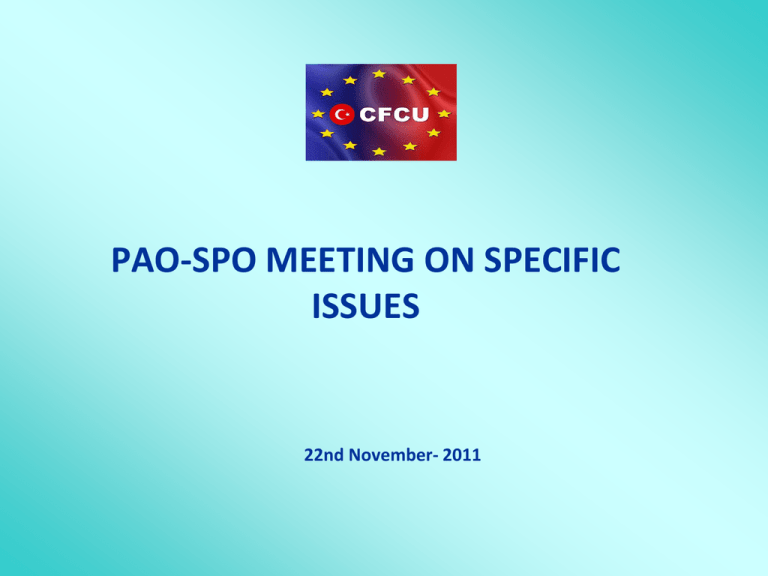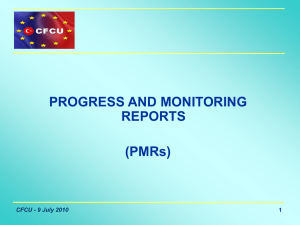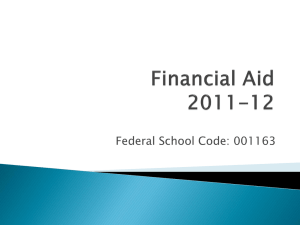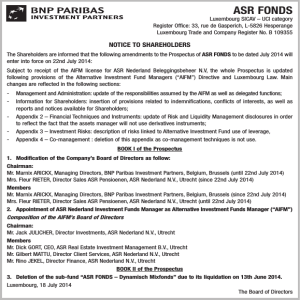PAO-SPO Meeting on Specific Issues (22.11.2011)
advertisement

PAO-SPO MEETING ON SPECIFIC ISSUES 22nd November- 2011 MAIN TOPICS PROCUREMENT Legal Framework Critical issues for a smooth tendering of a project Calendar for 2009&2010 National Programme FINANCE Why do we supervise? Upcoming Revisions in PMG and Check Lists: Approval of the Invoices including properly filled Checklist Incidental Expenditure Check Certificate of Origins MONITORING Progress and Monitoring Reports (PMR) and its relation with the flow of funds Provisional and Final Acceptances Timesheets Irregularity/Zero Irregularity Reporting CFCU - 22nd November 2011 2 WHY WE ARE DOING THESE? WHAT IS THE LEGAL FRAMEWORK? A. The requirements [selected indicative] of the IPA Regulation – 1085/2006 and its Implementing Regulation – 718/2007 for management and control B. IPA IR Article 11.3, Operational Agreement between PAO and SPOs. Where specific persons have been given responsibility for an activity in relation to the management, implementation and control of programmes, the beneficiary country shall enable such persons to exercise the duties associated with that responsibility, including in cases where there is no hierarchical link between them and the bodies participating in that activity. CFCU - 22nd November 2011 3 WHY WE ARE DOING THESE? WHAT IS THE LEGAL FRAMEWORK? C. Template for Self-Assessment Sheets D. PAO Analytical Report of SPO Self Assessment and Follow-Up on-thespot Assessment by PAO services under Article 11.3. and as input to Article 27 Statement of Assurance by NAO. In accordance with Article 25(5), the national authorising officer shall make an annual management declaration, which shall take the form of a statement of assurance to be presented to the Commission by 28 February each year. He shall forward a copy of the statement of assurance to the competent accrediting officer. The statement of assurance shall be based on the national authorising officer's actual supervision of the management and control systems throughout the financial year. CFCU - 22nd November 2011 4 WHY WE ARE DOING THESE? WHAT IS THE LEGAL FRAMEWORK? E. Senior Programme Officer (SPO) – Clarity of function Pursuant to article 75(3) of the IPA IR, PAO shall designate officials within the national administration as SPOs. Under the overall responsibility of the PAO concerned, SPOs shall carry out the following tasks: be responsible for the technical aspect of the operations within line ministries, assist the PAO in the good and timely preparation and implementation of operations at technical level, be in charge of the coordination within each priority axis set down in the beneficiary country’s project proposal. CFCU - 22nd November 2011 5 Why do we supervise? Operational Agreement PAO – SPO (OA), Article 4: The PAO is accountable to the NAO not only for the direct work of the CFCU but also for all the work of the SPO in respect of contracts and payments for which EU funding is sought. This accountability gives the PAO both the right and duty to provide guidance on systems and control requirements to the SPOs – and to exercise close supervisory monitoring over how the Line Ministry operate. CFCU - 22nd November 2011 6 PROGRAMME MANAGEMENT GUIDELINES PIM - Programme Implementation Manual “Program Uygulama El Kitabı” POG - Programme Operational Guide “Program Yürütme Rehberi” SPO Webpage http://www.cfcu.gov.tr/spo.php?lng=en Previous Presentations: http://www.cfcu.gov.tr/spo.php?action=sunu CFCU - 22nd November 2011 7 DIS/IPA Actors Competent Acrediting Officer (CAO) National IPA Coordinator (NIPAC) Financial Co-operation Committee (FCC) National Fund (NF) National Authorising Officer (NAO) Central Finance and Contracts Unit (CFCU) Programme Authorising Officer (PAO) Senior Programme Officers (SPO) Transition Assistance and Institution Building Committee (TAIB Committee) CFCU - 22nd November 2011 10 DIS/IPA Actors PRIME MINISTRY’S IPA CIRCULAR NO. 2011/15 Yetkili Akreditasyon Görevlisi (CAO): Yetkili Akreditasyon Görevlisi, Hazine Müsteşarlığından sorumlu Bakandır. Yetkili Akreditasyon Görevlisinin sekretarya hizmetleri Hazine Müsteşarlığı tarafından yürütülür. Ulusal Katılım Öncesi Yardım Koordinatörü (NIPAC): Katılım Öncesi Yardımın genel koordinasyonunu sağlamak üzere Ulusal Katılım Öncesi Yardım Koordinatörü olarak Avrupa Birliği Bakanlığı Müsteşarı görevlendirilmiştir. Ulusal Katılım Öncesi Yardım Koordinatörünün sekretarya hizmetleri Avrupa Birliği Bakanlığı tarafından yürütülür. CFCU - 22nd November 2011 11 DIS/IPA Actors PRIME MINISTRY’S IPA CIRCULAR NO. 2011/15 Ulusal Yetkilendirme Görevlisi (NAO): Ulusal Yetkilendirme Görevlisi olarak Hazine Müsteşarı görevlendirilmiştir. Avrupa Birliğinden sağlanacak fonların mali yönetimi, işlemlerin mevzuata uygunluğu ile yönetim ve kontrol sistemlerinin etkin işlemesinden sorumludur. Ulusal Fon: Hazine Müsteşarlığı bünyesinde bulunan Ulusal Fon, Ulusal Yetkilendirme Görevlisinin sorumluluğu altında, Katılım Öncesi Yardım Aracı çerçevesinde sağlanacak yardımların mali yönetimi ile görevlidir. CFCU - 22nd November 2011 12 DIS/IPA Actors PRIME MINISTRY’S IPA CIRCULAR NO. 2011/15 Ulusal Yetkilendirme Görevlisi Destek Dairesi: Hazine Müsteşarlığı bünyesinde bulunan UYG Destek Dairesi, Ulusal Yetkilendirme Görevlisinin sorumluluğu altında Katılım Öncesi Yardım Aracı çerçevesinde oluşturulan sistemin izlenmesi ile görevlidir. CFCU - 22nd November 2011 13 DIS/IPA Actors PRIME MINISTRY’S IPA CIRCULAR NO. 2011/15 Kıdemli Program Görevlisi (SPO): Katılım Öncesi Yardım Aracının 1. Bileşeniyle ilgili olarak Program Yetkilendirme Görevlisinin genel sorumluluğu altında, projelerin teknik uygulamasından sorumlu olan yararlanıcı kuruluşlarda görevli personeldir. SPO, proje hakkında yeterli bilgiye ve icra yetkisine sahip, uygun düzeyde yöneticiler arasından belirlenir. CFCU - 22nd November 2011 14 CRITICAL ISSUES FOR A SMOOTH TENDERING OF A PROJECT (1) Under the overall responsibility of the PAO, SPO shall perform the following tasks: Timely preparation of tender documents Submission of high quality tender documents Be aware of the time restraint due to the scheduled procedure in PRAG Constitution of a Project Coordination Unit composed of the technical staff in charge with the projects CFCU - 22nd November 2011 15 CRITICAL ISSUES FOR A SMOOTH TENDERING OF A PROJECT (2) Availability of the relevant staff from Beneficiary during the «tendering» period Proposing appropriate voting members in Evaluation Committees and in Shortlist Panels (with properly filled checklist by the SPO) No hierarchical link among the Evaluation Committee members with declaration of the SPO Responsibility of the Evaluation Committee to attend the tender evaluation (no assignment at home or abroad) CFCU - 22nd November 2011 16 CRITICAL ISSUES FOR A SMOOTH TENDERING OF A PROJECT (3) Preparation of an updated Technical Specifications and Market Survey in order to avoid any inconveniences during the tendering In need of “external expertise” in preparing the technical documents, “Project Preparation Facility-PPF” is available under the “Strengthening European Integration Process- SEI” Programme for such needs Communicate with the Ministry of EU Affairs, leading beneficiary organization of the SEI CFCU - 22nd November 2011 17 Time Schedule for Service Tenders Procedures last about 8-9 months Contract Signature Contract Award Tender Launch 50 days Receiving Initial Tender Documents Procurement Notice 30 days Tender Evaluation Forecast 30 days 3 months CFCU - 22nd November 2011 Short listing 6 months 18 Time Schedule for Supply Tenders Procedures last about 5-6 months Contract Signature Contract Award Tender Launch 60 days Receiving Initial Tender Documents Forecast 30 days Tender Evaluation 3 months CFCU - 22nd November 2011 6 months 19 Information for «Clarification» Period of Tenders Deadline for request for any clarifications from the Contracting Authority: 21 days before deadline for tenders Last date on which clarifications are issued by the Contracting Authority: 11 days before deadline for tenders Postponement of tender in delays of the publication/receiving of Clarifications CFCU - 22nd November 2011 20 CALENDAR FOR 2009&2010 NATIONAL PROGRAMMES Deadlines for 2009 IPA-I Projects Document Deadlines Contracting Deadline 13 December 2012 Execution Deadline 13 December 2014 Deadlines for 2010 IPA-I Projects Document Deadlines Contracting Deadline 13 April 2013 Execution Deadline 13 April 2015 CFCU - 22nd November 2011 21 Financial Management: Why do we Supervise? (1) Operational Agreement, Article 6, Responsibilities of the SPOs: Technical implementation of EU funded projects except the projects of Grant Beneficiaries: o Approval of the reports of contractors (“read and approved”) o Ensuring that the provisional and final acceptances are properly made (“read and approved”), o Approval of experts’ timesheets (“read and approved”), o Approval of technical documents and payments requests/invoices prior to financial check and payment by CFCU (“read and approved”). CFCU - 22nd November 2011 22 Financial Management: Why do we Supervise? (2) Operational Agreement, Article 13, Payments: Payments shall be made by the CFCU to the contractors in accordance with the EC procedures after technical verification by the SPO of the technical documents and, payment requests/invoices prior to financial check and payment by CFCU according to contractual provisions. CFCU - 22nd November 2011 23 Upcoming Revisions in PMG and Check Lists (1) Program Management Guidelines (PMG) for the SPOs will be improved in order to clarify the provisional and final acceptances in accordance with the written procedures Serial numbers of the goods will be listed and annexed to the «Muayene ve Kabul Tutanağı» «Muayene Kabul Tutanağı» will be formed in dual language (EN/TR) CFCU - 22nd November 2011 24 Upcoming Revisions in PMG and Check Lists (2) Check points will be added to the SPO checklists regarding the “second hand equipment” For service and framework contracts, timesheets and list of incidental expenditures will be sent to SPOs for Read and Approved For supply and works contracts, the copy of the “Certificate of Origin”documents will be sent to SPOs for Read and Approved CFCU - 22nd November 2011 25 Focus on «Eligiblity» Matters Check lists should be properly filled; o Partly filled SPO checklists puts the eligibility of the items into question in the eyes of auditors The SPOs are requested to check the Certificates of Origin and cross-check the information in the certificates against the physical supplies “Read and Approved” stamped copies of the invoices should be signed by the SPO and a second person authorised (dual signature) If requested, extra guidance will be provided by the Finance Department of the CFCU on filling of checklists CFCU - 22nd November 2011 26 Payment with SPO «Read and Approved» All the payments necessitate SPO «Read and Approved»: CFCU has 45-day contractual period after receiving a request for payment/invoice to realize payment to contractor. CFCU allocates 15 days of this period to the SPO while keeping one month for its own internal verifications. In exceptional situations, if read and approved received before the 45th day, payment is made under normal circumstances. no feedback received not later than 44th day, in order to prevent interest requests of the contractors, payment is made with a reminder to the SPO. If CFCU - 22nd November 2011 27 Other Obligations of the SPOs (1) Operational Agreement, Article 9, Co-Financing Requirements: Where co-financing is foreseen for any project, the SPO shall be responsible for ensuring the commitment of the National Contribution from the appropriate Ministry or Government Body CFCU - 22nd November 2011 28 Other Obligations of the SPOs (2) Operational Agreement, Article 10, Transfer of Funds: To enable the CFCU to formally request funds from the National Fund the SPO shall fill the Progress and Monitoring Reports (PMR) PMRs are on a quarterly basis through electronic media developed by the CFCU PMRs should be finalised no later than the 5th working day of the following month of each quarterly period (i.e. the PMRs for 1st Quarter 2011 - January-February-March 2011- to be filled till 5 April 2011), as stipulated in Article 16, paragraph 2. CFCU - 22nd November 2011 29 Project Monitoring PROGRESS AND MONITORING REPORTS (PMRs) – QUARTERLY BASIS PROGRESS REPORTS submitted to CFCU on MONTHLY BASIS CFCU - 22nd November 2011 MONITORING REPORTS submitted to MEU (former EUSG) BIANNUALLY 30 New PMRs via Electronic Media (1) No hardcopies/signatures Preparation / circulation via electronic media. https://progress.cfcu.gov.tr/ CFCU - 22nd November 2011 31 New PMRs via Electronic Media (2) This allows you to reach the system at any time and prepare the PMRs from anywhere CFCU - 22nd November 2011 32 Workflow in PMR ACTORS ACTIONS Beneficiary Prepare / Revise / Approve MEU Approve / Reject with comments CFCU Approve / Reject with comments EU Delegation Preview / Comment via e-mail National Fund Preview / Comment via e-mail CFCU - 22nd November 2011 33 Workflow in PMR SPOs Approves MEU Approves CFCU Approves & Visible to All Parties NF EUD CFCU - 22nd November 2011 MEU SPOs 34 Importance of PMRs PMRs are attached to the «Request for Funds» from the EU Commission If any PMR of any Project is missing/low quality The risk of suspension of Funds CFCU - 22nd November 2011 35 Frequently Made Mistakes (1) User Name and Password – “Forget Password” Delete/Record same users more than once Replacement of Personnel o o “SPO” and “SPO Admin” CFCU “SPO Prepare”, “SPO Prepare and Approve” and “Read Only” SPO Admin CFCU - 22nd November 2011 36 Frequently Made Mistakes (1-a) Forget Password CFCU - 22nd November 2011 37 Frequently Made Mistakes (1-b) Record Users CFCU - 22nd November 2011 38 Frequently Made Mistakes (1-b) Record Users CFCU - 22nd November 2011 39 Frequently Made Mistakes (1-b) Assign Users CFCU - 22nd November 2011 40 Frequently Made Mistakes (2) Display of Approve) o o Buttons (Save-Close-Preview- Who is in the queue can view Save-Approve button. Everyone can view Close-Preview buttons in every stage Trying to revise PMR after approval (but not possible) CFCU - 22nd November 2011 41 Frequently Made Mistakes (2-a) Display of Buttons SPO PREPARE SPO PREPARE and APPROVE (SPO P&A) SPO (after SPO P&A Approval) CFCU - 22nd November 2011 42 Frequently Made Mistakes (3) Using of the filters – Selecting the right PMR year and Quarter CFCU - 22nd November 2011 43 Frequently Made Mistakes (4) Confusing User Roles (SPO, SPO Prepare and Approve, SPO Prepare, SPO Read Only) PMR web address not http; https Screen resolution - PMR system works with best resolution 1280X768 CFCU - 22nd November 2011 44 SUPPLY Provisional Acceptance Special Conditions, Art.13 Delivery, installation, putting into operation, inspection and testing must be completed (see Annex II, Article 1.4). Inspection and testing shall be completed after the supplies have been physically delivered, installed and put into operation. Inspection and testing will be completed before training starts. Training shall be organised after the inspection and testing are completed (see Annex II, Article 1.3). Provisional acceptance shall take place after the request of the contractor within the period stipulated in the Contract following completion of delivery, installation, putting into operation, inspection, testing and training. CFCU - 22nd November 2011 45 SUPPLY Provisional Acceptance Special Conditions, Art.31) The Contractor informs the CFCU in writing on being ready for the provisional acceptance. CFCU writes a letter to the Beneficiary including the template documents with some guidance for starting the provisional acceptance study. The Beneficiary performs the study and signs Provisional Acceptance Certificate and «Muayene Kabul Tutanağı» together with the Contractor and sends the documents to the CFCU / Rejects the provisional acceptance study and inform the CFCU in writing. CFCU - 22nd November 2011 46 SUPPLY Provisional Acceptance Special Conditions, Art.31 After receiving these documents, CFCU realizes a «Monitoring Visit» to delivery place(s) in order to identify the correctness of the information provided in the Provisional Acceptance Certificate without prejudice to the technical responsibility of SPO (availability of the supplies in delivery place, brand and model name of the products, serial numbers, origin of the supplies, visibility rules etc.) CFCU endorses the Provisional Acceptance Certificate, if there is no inconformity with the Contract. Warranty Period (Art. 32) starts on the date of signature of the Provisional Acceptance Certificate by the PAO. CFCU - 22nd November 2011 47 SUPPLY Provisional Acceptance Committee Committee should be composed of minimum 3 people Committee members should be assigned carefully by choosing «qualified people» in technical and language aspects Moreover, the Committee members are required to behave objectively and should check the compliance of the goods with the specifications of the contract not with their individual expectations CFCU - 22nd November 2011 48 SUPPLY «Technical Documents» to be provided during the Provisional Acceptance Period The equipment shall have all necessary documents as specified in Art. 1.5 of Technical Specfications such as; Operating and maintenance manuals Drawings Material certificates Conformity certificates Test certificates Certificates of Origin (to the CFCU) Planning, packing lists Others specified CFCU - 22nd November 2011 49 SUPPLY «Obligatory documents» for the provisional acceptance Original certificate of origin by Chamber of Commerce (for all equipment) Warranty documents of the manufacturers and/or the suppliers (for all equipment) (see Art.32 of Special Conditions) Others CFCU - 22nd November 2011 to the CFCU to the Beneficiary 50 SUPPLY Frequently Made Mistakes during Provisional Acceptance Process Provisional Acceptance Certificate (PAC) shall not be considered as «Provisional» in deed Becomes the property of the Beneficiary PAC can not be issued; o Before all the requirements in the Contract are completed by the Contractor (delivery, installation, put into operation, training etc.) o If the equipment is still packed and not installed o If any change in brand/model name of equipment without CFCU approval CFCU - 22nd November 2011 51 SUPPLY Packed Equipment – Wrong Practice CFCU - 22nd November 2011 52 SUPPLY Visibility (Technical Specifications, Art. 2) All equipment shall have a solidly fixed and durable label, size 75 mm x 35 mm, as appropriate for each equipment, with the standard EU logo as below: National programme for Turkey 2007 under the IPA-Transition Assistance and Institution Building Component EuropeAid/126827/D/SUP/TR Lot No : Item No : Serial No : %75 Avrupa Birliği Katkısı, %25 Ulusal Katkı ile alınmıştır CFCU - 22nd November 2011 53 Supply Contracts (best samples) CFCU - 22nd November 2011 54 Supply Contracts (Wrong Samples) Use of weak paper stickers should be avoided. CFCU - 22nd November 2011 55 Service Contracts - Notepad - Name Tag - CD Cover CFCU - 22nd November 2011 56 SUPPLY Packed Equipment – Wrong Sample CFCU - 22nd November 2011 57 SUPPLY/WORKS Visibility Plaque CFCU - 22nd November 2011 58 SUPPLY Attachments of the Provisional Acceptance Certificate Followings should be submitted to the CFCU with the Certificate; Provisional Acceptance Certificate (3 originals) Muayene ve Kabul Tutanağı (2 originals) Technical Specifications checked by the Committee Training Documents/Records (in accordance with Annex II, Article 1.3) List of serial numbers of each equipment, if applicable, by the delivery places CFCU - 22nd November 2011 59 WORKS Provisional Acceptance/Taking-over Procedure (1) Provisional Acceptance/Taking Over will be done in line with Special/Particular conditions and General Conditions of the Contract. PRAG type contract (please refer to Article 60) FIDIC type contract (please refer to Article 10) Taking Over/Provisional Acceptance shall take place within 30 days/28 days after the request of the Contractor. CFCU - 22nd November 2011 60 WORKS Provisional Acceptance/Taking-over Procedure (2) The Contractor may apply, by notifying the Supervisor/Engineer, for a certificate of provisional acceptance not earlier than 15 days (for PRAG)/14 days (for FIDIC) before the works are, in the Contractor's opinion, complete and ready for provisional acceptance. The Supervisor/Engineer shall within 30 days (for PRAG) / 28 days (for FIDIC) of receipt of the Contractor's application either: a) writes a letter (declaration) to the CFCU that all the works are going to finish within the contract duration and site is ready for the provisional acceptance/taking over or, a) rejects the application, giving his reasons and specifying the action which, in his opinion, is required of the Contractor for the certificate to be issued. CFCU - 22nd November 2011 61 WORKS Provisional Acceptance/Taking-over Procedure (3) CFCU writes a letter to the Beneficiary in order to establish a Provisional Acceptance/Observation Team to implement the provisional acceptance/ taking over of works, after receiving the notice of the Supervisor/Engineer. The Committee, signs a «Memorandum» after completion of the provisional acceptance/taking over that either: i. works are completed according to the declaration of the Supervisor/Engineer and their inspection and signs the Memorandum or i. fixes a verification date for the «outstanding works» CFCU - 22nd November 2011 62 WORKS Provisional Acceptance/Taking-over Procedure (4) In case of (ii), maximum 30 days (for PRAG) / 28 days (for FIDIC) is given to the contractor to finalise the outstanding/faulty works and within this 30 days/28 days the Contractor writes a letter to the Supervisor that all the outstanding/faulty works are completed and ready for inspection After verification of the works another Memorandum is held by the acceptance committee members that all the outstanding/faulty works are completed / corrected as per design and specifications. The Supervisor/Engineer prepares the Provisional Acceptance/Taking Over Certificate and sends the Certificate with the signed Memorandum to the CFCU with a letter stating the provisional acceptance/taking over of the works was completed CFCU, endorses the Provisional Acceptance/Taking Over Certificate after performing all regular checks CFCU - 22nd November 2011 63 WORKS Provisional Acceptance/Taking-over Committee The Taking Over/Provisional Acceptance shall be executed by the Supervisor/Engineer. Representatives of SPO shall attend Taking Over process as observer(s)/member(s). The observer(s)/member(s) of SPO should be assigned carefully by choosing «qualified people» in technical and language aspects and they should also be familiar with the procurement procedures. The Committee should be composed of minimum 3 people CFCU - 22nd November 2011 64 SUPPLY Final Acceptance (General Conditions, Art. 34) The final acceptance certificate shall be issued; by the «Project Manager» (PAO) within 30 days of the expiry of the warranty period or as soon as any repairs ordered under Article 32 have been completed to the satisfaction of the Project Manager. CFCU - 22nd November 2011 65 SUPPLY Final Acceptance Procedure (General Conditions, Art.34) Upon expiry of the warranty period or, where there is more than one such period (in case of partial acceptance ), upon expiry of the latest period, and when all defects or damage have been rectified; The Contractor informs the CFCU in writing on being ready for the final acceptance. CFCU writes a letter to the Beneficiary for starting the final acceptance study and sends the template documents. The Beneficiary performs the study and signs the Final Acceptance Certificate together with the Contractor in 3 originals and sends to the CFCU. CFCU issues the Final Acceptance Certificate and sends one original to the Beneficiary, one original to the Contractor. CFCU - 22nd November 2011 66 SUPPLY Final Acceptance (General Conditions, Art. 34) The subject of final acceptance certificate; The defects/damages occurred during the warranty period (1 year following the issuance of provisional acceptance certificate) Not making up the deficiencies After Warranty Period is over The Beneficiary is responsible for remedying any defect/damage CFCU - 22nd November 2011 67 WORKS Final Acceptance Procedure (1) Final Acceptance will be done in line with Special/Particular conditions and General Conditions of the Contract. PRAG type contract (refer to Article 62) FIDIC type contract (refer to Article 11) Final Acceptance shall take place within 30 days/28 days after the request of the Contractor CFCU - 22nd November 2011 68 WORKS Final Acceptance Procedure (2) Upon expiry of the maintenance period or, where there is more than one such period, upon expiry of the last period, and when all defects or damage have been rectified, the CFCU writes a letter to the Beneficiary that maintenance/defects notification period was finalised and Final Acceptance Team need to be established for the Final Acceptance of the works Final Acceptance Committee gather together with the Supervisor/Engineer and Contractor (if participates) and holds the acceptance of works After completion of the final acceptance, the committee signs a Memorandum that either: i. works are completed according to the declaration of the Supervisor/Engineer and their inspection and signs the Memorandum or ii. fixes a verification date for the defected works CFCU - 22nd November 2011 69 WORKS Final Acceptance Procedure (3) In case of (ii), verification of the works by the Final Acceptance with a view to final acceptance shall take place in the presence of the Contractor. The absence of the Contractor shall not be a bar to verification, provided that the Contractor has been summoned in due form at least 30 days (for PRAG)/ 28 days (for FIDIC) prior to the date of verification. After verification of the works another Memorandum is held by the committee members that all the outstanding/faulty works are completed / corrected as per design and specifications The Supervisor/Engineer sends the signed Final Acceptance/Performance Certificate to the CFCU with the attachment of Final Acceptance Memorandum with a letter stating the final acceptance of the works was completed. CFCU endorses the Final Acceptance Certificate after performing all regular checks and sends one original to the Beneficiary, one original to the Contractor. CFCU - 22nd November 2011 70 WORKS Final Acceptance Committee The Final Acceptance shall be executed by the Supervisor/Engineer. Representatives of SPO shall attend Final Acceptance process as an observer(s)/member(s). The observer(s)/member(s) of SPO should be assigned carefully by choosing «qualified people» in technical and language aspects and they should also be familiar with the procurement procedures. The Committee should be composed of minimum 3 people CFCU - 22nd November 2011 71 SERVICE CONTRACTS Timesheets (1) What is timesheet? Legal Basis Contract Types Procedure to be followed Weekend, home-based workings CFCU - 22nd November 2011 72 SERVICE Timesheets (2) Indicates the working days of the experts (both KE and NKE) on a timely basis Indicates the per diems that experts deserved Provides the basis for interim payment to the Consultant, hence, the experts CFCU - 22nd November 2011 73 SERVICE Timesheets (3) Invoices must be accompanied by copies of the corresponding approved timesheets to verify the amount invoiced for the time input of the experts. Timesheets should be approved by the SPO or his delegate in line with the responsibilities defined in the «Operational Agreement» CFCU - 22nd November 2011 74 SERVICE Timesheets (4) Timesheets are signed in following contracts. Direct Grant Twinning (for RTA Assistants) Service - Technical Assistance - Supervision - Framework - Direct Agreement CFCU - 22nd November 2011 75 SERVICE Timesheets (5) Timesheets are submitted for approval of the SPO at the end of the month (not before the month ends) No need for sending timesheets to the CFCU by the SPO Approved timesheets are submitted by the Consultant to the CFCU as an internal part of financial annex during interim/final payment requests CFCU - 22nd November 2011 76 IRREGULARITY Irregularity shall mean; any infringement of a provision of applicable rules and contracts resulting from an act or an omission by an economic operator which has, or would have, the effect of prejudicing the general budget of the European Union by charging an unjustified item of expenditure to the general budget. CFCU - 22nd November 2011 77 FRAUD Fraud shall mean; any intentional act or omission relating to: the use or presentation of false, incorrect or incomplete statements or documents, which has as its effect the misappropriation or wrongful retention of funds from the general budget of the European Communities or budgets managed by, or on behalf of, the European Communities; non disclosure of information in violation of a specific obligation with the same effect; the misapplication of such funds for purposes other than those for which they are originally granted. CFCU - 22nd November 2011 78 TYPES OF IRREGULARITY Technical Contractual Financial Administrative CFCU - 22nd November 2011 Any of those irregularity can be intentional or unintentional and their nature may be systemic or one-off 79 UTMOST REPORTED IRREGULARITY TYPES 207- Request for aid incorrect or incomplete 213- Falsified supporting document 214- False or falsified certificates 325- Non eligible expenditure 499- Other irregularities by the operator 607- Absence of the evidence required 611- Several requests for the same object 612- Failure to respect other regulations/contract conditions 614- Infringement of rules concerning public procurement 810- Action not implemented 811- Action not completed 812- Action not carried out in accordance with rules 831- Over financing CFCU - 22nd November 2011 80 SOURCES OF IRREGULARITIES* Disclosure of information that affect the principle of open and fair competition Hidden a conflict of interest Collusion with a tenderer Inappropriate use of equipment/material supplied Submission of provisional/final acceptance of goods report false or incorrect information in relation quantities and TS *PIM 8.3 CFCU - 22nd November 2011 81 Why do we report? Commission Regulation 718/2007 (IPA Implementing Regulation Article 19) Accreditation Criteria- Annex to 718/2007 IPA Framework Agreement (Article 28) Commission Regulation 1828/2006 (Article 28/1) Financing Agreements (available at CFCU website): http://www.cfcu.gov.tr/spo.php?lng=en CFCU - 22nd November 2011 82 Why do you report? Operational Agreement Article 6- Responsibilities of the Senior Programme Officers The immediate reporting of any determined/suspicious irregularity to the CFCU and, where non detected, the preparation and submission of a quarterly “Zero” Irregularity Report to the CFCU, Article 16 (2) Reporting Immediate information on any determined/suspicious irregularities that may have occurred or, if none then, the submission of a “Zero” Irregularity Report (Annex 4) on a quarterly basis by the 5th working day of the following month of each quarterly period. Annex 1- Declaration of the Senior Programme Officer (6) to submit quarterly irregularity reports to the CFCU in accordance with the forms forwarded by the CFCU CFCU - 22nd November 2011 83 When do you report? (1) Immediate Reporting*: As the «Irregularity Officer», SPO should report all the irregularities detected within the SPO office or by the SPO and reported irregularities by the line ministry immediately to the PAO (CFCU) by using the standard form. All the documents certifying that irregularity was committed should be annexed to the irregularity report. *Follow-up reports: Information on important changes resulting from the instituted procedures with respect to irregularities previously notified should be reported until the irregularity is resolved by using the standard form. CFCU - 22nd November 2011 84 When do you report? (2) Zero Irregularity Report: If there is not a specific irregularity reported in a quarter, not only from the SPOs but also from own activities and LMs activities regarding the projects in the FAs, the Zero Irregularity Report, prepared by SPO should be submitted to the PAO by the 5th working day of the month following the end of each quarter by using the standard form. CFCU - 22nd November 2011 85 How do we report? (1) WORKING DOCUMENTS AND GUIDELINES of OLAF & AFIS CFCU - 22nd November 2011 86 How do we report? (2) AFCOS SPO CFCU NAO OLAF EUD CFCU - 22nd November 2011 87 How do we report? (3) OLAF: EUROPEAN ANTI-FRAUD OFFICE AFCOS: ANTI-FRAUD COORDINATION STRUCTURE (Başbakanlık Teftiş Kurulu) CFCU - 22nd November 2011 88 How do you report? Programme Management GuidelinesProgramme Implementation Manual (PIM) 8.6.Reporting Irregularities Operational AgreementAnnex 4- Template Irregularity Reports - QZIR IRREGULARITY REPORT Gülşad Yalpu: Irregularity Officer gulsad.yalpu@cfcu.gov.tr CFCU - 22nd November 2011 89 Other Responsibilities PIM 8.4.1 The SPO, as the Irregularity Officer at the SPO Office level, will inform staff and final beneficiaries about: o Irregularities classification o Preventive actions o Reaction to irregularities and to omissions PIM 8.6.3 The Irregularity Officer should ensure that the irregularities reported by the staff is registered to irregularity register and is submitted to the PAO together with the measures taken by SPO. CFCU - 22nd November 2011 90 THANK YOU FOR YOUR ATTENTION CFCU - 22nd November 2011 91








